

FID CONSOLIDATES ACADEMIC AND RESEARCH GROWTH

EDITOR-IN-CHIEF
Professor Tembisa Ngqondi
- FID Dean
EDITOR
Philani Nombembe nombembep@cput.ac.za
NEWS EDITOR
Jim Mohlala
mohlalaj@cput.ac.za
Submit story ideas to nombembep@cput.ac.za or mohlalaj@cput.ac.za
no later than the 15th of every month. Faculty of Informatics andDesign

FID strengthens industry ties, research output and student success
FID consolidates academic and research growth
Design graduates continue Dean’s Medal streak
FID moves to standardise quality management
CPUT’s Moodley to chair Africa’s top planning conference
Fashion students promote sustainable designs
CPUT named Huawei ICT Academy Support Centre as partnership grows
Two days inside the 2025 Cisco Instructor & Partner Conference From conflict to cum laude
Colleague killed in Philippi remembered at campus memorial

Forging dreams in metal
MICT SETA bursaries strengthens industry-academic links
Cultural Identities of Africa exhibition showcases student creativity
Chasing punchlines
06 07 08 09 10 11 12 03 04 05

Editorial
FID STRENGTHENS INDUSTRY TIES, RESEARCH OUTPUT AND STUDENT SUCCESS
The FID is making steady progress. Postgraduate output is up, research productivity is improving, and our ties with industry are growing stronger.
Our partnership with Huawei and recognition as an ICT Academy Support Centre reflect the faculty’s focus on skills and innovation. These collaborations help us stay aligned with industry needs. Our students are also achieving.
Gugulethu Mahlangu, a recent graduate in Architectural Technology, received the Dean’s Medal for top academic performance. Her success reflects the dedication of both students and staff.

Sustainability remains a key priority. During Fashion Revolution Week, students presented garments made from repurposed materials, showing how design can respond to global challenges. Looking ahead, we remain focused on quality education and community impact.
We also pause to remember our late colleague, Nolonwabo Tshumsila, who lost her life in Philippi. May her memory stay with us.
Jim Mohlala News Editor
FID CONSOLIDATES ACADEMIC AND RESEARCH GROWTH
By Jim Mohlala
A lot can happen in four years — ask the Faculty of Informatics and Design (FID).
From tightening its systems to leading the pack in postgraduate output, the faculty has been quietly but steadily raising its game. Since 2020, FID has made a series of practical changes to how it operates. It rolled out standard operating procedures across departments, making sure day-to-day processes line up with how the wider university runs.
These were not just admin tweaks — they were part of a bigger push to strengthen how the faculty works, teaches, and manages its research. On the academic front, postgraduate education has made a clear leap. The faculty now produces more master’s and PhD graduates than any other at Cape Peninsula University of Technology (CPUT). According to Dean Professor Tembisa Ngqondi, the research output has shot up by over 150% compared to previous years.
Curriculum changes have also been on the cards. A review of so-called ‘gatekeeping rules’ — those that made it harder for students to progress — led to reforms aimed at helping students move through their courses smoothly and finish on time.
According to internal reports, these changes have already made a difference in graduation rates. Ngqondi said FID has embraced broader university projects like the Pegasus Project, a work-sharing model, and Smart Access.
Industry partnerships have also been a major part of the faculty’s agenda. FID has struck up collaborations with companies like Pick n Pay and Huawei and built links with international partners through the Erasmus Programme and the Massachusetts Institute of Technology.
“Many of these partnerships have opened doors for applied research and student-led innovation,” said Ngqondi. “To build community and student engagement, the faculty launched its platforms — the FID Pulse newsletter and podcasts — giving students a voice and a space to practise media and communication skills. It also introduced design hubs and industry webinars to give students a sense of real-world expectations while still in training.”
Improving the routes between qualifications has been another focus.
“For example, where students previously struggled to move between certain diplomas and degrees, work has been done to align these paths more clearly.”
The faculty also continues to build its internal relationships. It has worked closely with the Office of the Vice-Chancellor and the Faculty of Applied Sciences on joint initiatives — including revived projects in fashion and design innovation.
Reflecting on her time as dean, Ngqondi said the job demands patience and focus.
“The focus remains on the faculty’s mandate — research, teaching, and transformation. These are ongoing projects that require long-term commitment,” she said.
Looking ahead, FID is developing a Cybersecurity Simulation Facility and planning new postgraduate and research-led initiatives.
“It is also rethinking how it fits into the university’s bigger picture as CPUT rolls out its Vision 2030 strategy,” said Ngqondi.
“This work would not have been possible without the collaborative efforts of staff, the strategic input of the Faculty Board Executive, and the commitment of our students.”


REFLECTING: FID Dean Professor Tembisa Ngqondi reflects on the faculty’s achievements over the past four years. PICTURE: Supplied.
DESIGN GRADUATES CONTINUE DEAN’S MEDAL STREAK
By Philani Nombembe
Graduates from the Department of Architectural Technology and Interior Design have drawn a line in the sand, setting a new benchmark for academic excellence.
For the third consecutive year, a student from the department has received the Dean’s Medal. The latest recipient, Gugulethu Mahlangu, 21, graduated summa cum laude with a Diploma in Architectural Technology in April. She achieved distinctions in all subjects and an overall average of 80%.
“The journey is still unfolding,” said Mahlangu. “It honestly feels amazing to have been awarded the Dean’s Medal — I’m grateful. It’s one of those moments that makes you reflect on how far you’ve come. It wasn’t always easy, so this recognition means a lot to me and everyone who’s been part of the journey.”
She is now enrolled in the Advanced Diploma in Architectural Technology and plans to pursue a Master’s degree.
“I’m only 21. I have many aspirations within this industry, and I know I’ll need to work even harder to achieve them,” she said.
Mahlangu matriculated from Fourways High School, Johannesburg, in 2021. Initially considering accounting or medicine, she discovered her interest in architecture in 2020.
“When you’re passionate, motivation comes naturally,” she said.
During her studies, Mahlangu was selected to exhibit her design portfolio at the Cape Institute for Architecture in both her second and third years. She also participated in the 2024 Caesarstone Student Designer Competition.
According to the CPUT graduation programme: “Gugulethu’s exceptional academic performance earned her bursaries from W Architects for her diploma studies, and the McMillan Foundation bursary, which is fully funding her current studies.”
Dr June Jordaan, programme coordinator for Architectural Technology, said Mahlangu had demonstrated a clear design blueprint for success.“Gugulethu is an exceptionally talented architecture student whose
dedication and creativity have consistently set her apart. At the top of her class, she has demonstrated outstanding technical skills, innovative design thinking, and an unwavering commitment to excellence,” said Jordaan.
“Her ability to balance aesthetic vision with practical solutions is truly inspiring. Gugu’s collaborative spirit, work ethic, and passion for architecture make her an asset to any team or project. She is destined for great success in her field.”
In 2023, Rebekah van Roy received the Dean’s Medal after graduating with a Diploma in Architectural Technology.
“Rebekah was an exceptional architecture student whose dedication and diligence set her apart,” said Jordaan. “Her innovative designs and meticulous attention to detail demonstrated both technical expertise and creative flair. Rebekah consistently delivered high-quality work, balancing academic excellence with collaborative teamwork. Her strong work ethic and proactive approach ensured she met every challenge with confidence and purpose.”
In 2022, Jamie Scholtz received the Dean’s Medal upon graduating cum laude with an Advanced Diploma in Interior Design.
Interior Design programme coordinator Colleen Cocotos said Scholtz “achieved an extraordinary milestone by winning three international design competitions in her final year” — a result of her talent and the department’s design critique support.
“With gentle guidance, Jaime’s work reached a global stage. Her Oasis Medicare Clinic was awarded Jury’s Favourite – Interior Design (Institutional) at the BLT Built Design Awards 2022 for its inclusive, sustainable healthcare design,” said Cocotos.
“Her luminaire, KLOK, won the Floor Lamp Design category at the LIT Lighting Design Awards. She also secured first prize in the Accor Hospitality Design Competition, leading to a showcase of her work at Maison & Objet in Paris.
“Jaime’s success highlights not only her creativity and determination but also the department’s commitment to mentoring and academic support.”

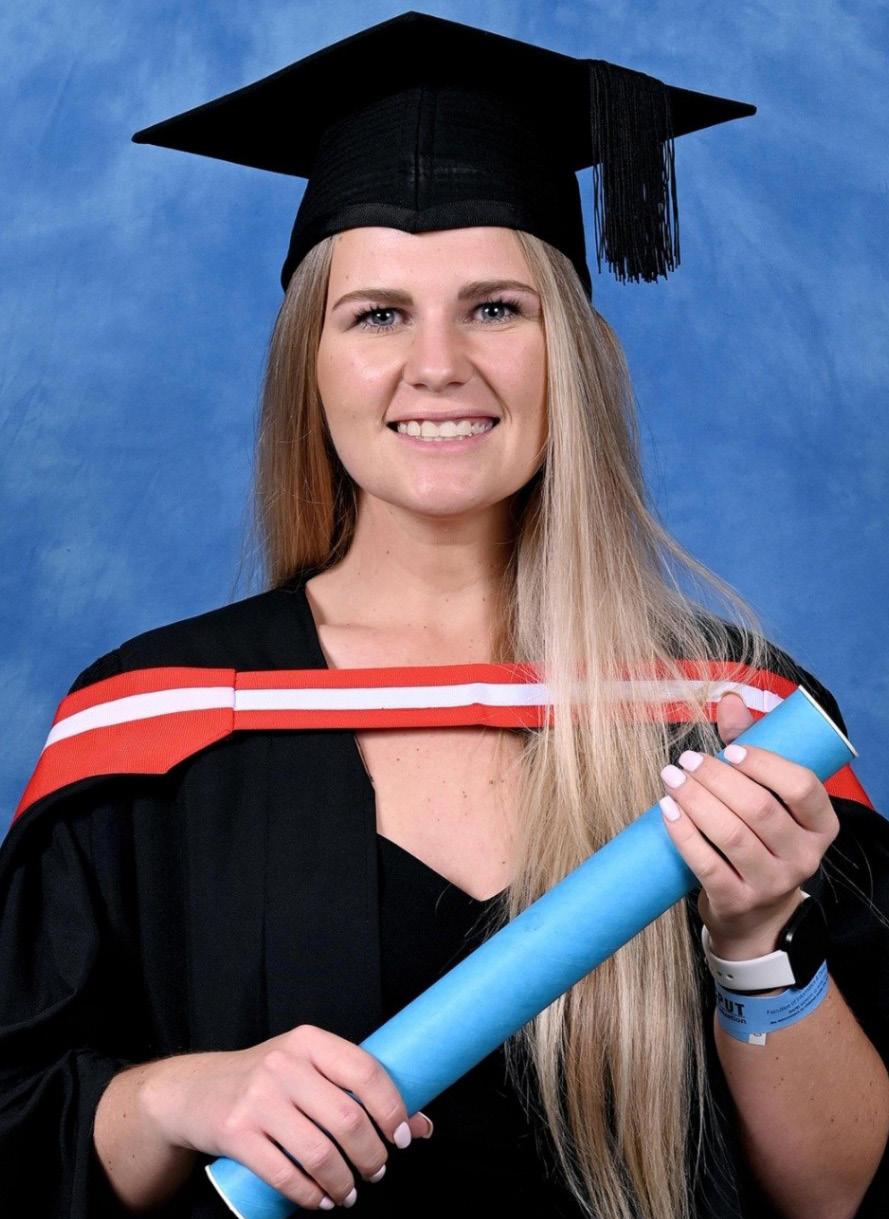
FID MOVES TO STANDARDISE QUALITY MANAGEMENT
By Jim Mohlala

The Faculty of Informatics and Design (FID) has taken a key step towards strengthening internal governance. FID has drafted its first Quality Management Practice Standards (QMPS) document. The draft was compiled during a workshop on 8 April 2025, facilitated by Professor Siyanda Makaula from the Quality Management Directorate (QMD), and coordinated by Assistant Dean, Professor Masilonyana Mokhele.
The process involved four working groups, led by FID Dean Professor Tembisa Ngqondi, Amanda Morris, Dr Monica Di Ruvo and Dr Tabisa Ncubukezi. Each group contributed to different sections of the document, focusing on the management structures and quality assurance processes across the faculty.
A task team, comprised of Wendal Koopman, Brian Fisher-Holloway and Mokhele consolidated these inputs into a single draft, which has been submitted to the Faculty Board Executive for review. Ngqondi said the faculty aims to fully align with the university’s quality management framework.
“The governance, planning and design standard is central to clarifying structures and decision-making authority within the faculty,” she said.
The draft QMPS document is intended to guide governance, programme design, and planning processes across all FID departments. The QMD has supported the initiative throughout the drafting phase.
Gugulethu Mahlangu
Jaime Scholz
Management Practice Standards at a workshop led by Professor Siyanda Makaula on 8 April 2025. PICTURE: Supplied.
MOODLEY TO CHAIR AFRICA’S TOP PLANNING CONFERENCE
By Philani Nombembe

TRAILBLAZER: SAPI President Dr Johannes Muluadzi and SACPLAN Acting CEO Bongumusa Ndwandwe recognise ATID Head Rayner Moodley (centre) for his contribution to the industry. PICTURE: Supplied.
The industry continues to recognise the head of the Architectural Technology and Interior Design Department (ATID) for his expertise and contribution.
Rayner Moodley has been appointed chair of Africa’s largest urban planning conference, set to take place in Cape Town in 2026. The South African Planning Institute (SAPI) holds the Planning Africa conference, which brings planning professionals together from across the continent under one roof annually.
Moodley was recognised with two coveted awards at 2024 conference in Durban. He received the Outstanding Planner in South Africa award and was one of five recipients. The Western Cape region, which he chairs, was also named the Most Promising Region.
“Winning these two awards is both an honour and serves as a significant milestone in my career,” said Moodley.
“Being recognised as one of the top five outstanding planners in South Africa reinforces the importance of focus, hard work, and dedication, supported by a strong network both at home and within my workplace. This accolade is not just a personal achievement but a testament to the collective effort and support from my family and mentors within and outside of CPUT (Cape Peninsula University of Technology).”
Moodley received the 2022 South African Council of Planners Award for Top Young Planner in the academic category. He serves as chair of SAPI Western Cape and sits on the SAPI national executive committee. He remains actively engaged with developments and trends in the field.

“To stay relevant with developments in planning while serving as Head of Department at ATID, I actively engage with professional associations such as SAPI. My roles as chair of the Western Cape and a member of the SAPI national executive committee keep me informed about the latest trends and advancements in the field,” said Moodley.
“Balancing these responsibilities involves effective time management and leveraging the support of my team at CPUT. By integrating insights gained from these roles into my work at ATID, I ensure that both my academic and professional contributions remain current and impactful.”
FASHION STUDENTS PROMOTE SUSTAINABLE DESIGNS
By Jim Mohlala
The Fashion Revolution Week at the District Six campus sparked more than just style.
It saw students trade pre-loved pieces, breathing new life into forgotten wardrobes while championing sustainability through upcycled designs. Held on Friday, 25 April 2025, the event encouraged students and staff to exchange pre-owned clothing while highlighting sustainable fashion through student-designed garments made from second-hand items and textile factory waste.
Fashion lecturer Siviwe Jack said the theme focused on reducing fashion waste and rethinking how clothing is produced and consumed.
“We wanted students and the wider campus community to reflect on their relationship with clothing and explore alternative approaches with less environmental impact,” said Jack.
Student work included repurposed jackets and garments created entirely from discarded fabrics. One group designed an outfit from surplus factory material, illustrating the scale of waste generated before clothes reached the market.
“There’s still a perception that ethical fashion is either unaffordable or unstylish,” Jack said.
“Our students challenged that view through practical design.” Audience engagement was high, with students, staff, and visitors taking part in the swap and viewing the showcase.
Third-year fashion student Portia Mofokeng said the project helped her approach fashion more critically.
“We are learning about the impact of fast fashion, not just environmentally, but on workers too,” she said. “This has changed the way I shop and the kind of work I want to produce.” →



← Mofokeng said she would welcome similar initiatives in future, noting that the event provided a platform for students to engage with sustainability in a meaningful way.


STYLE WITH PURPOSE: Fashion Revolution Week at the District Six campus turned heads and mindsets. Students and staff swapped pre-loved clothes and showcased upcycled designs to promote sustainable fashion. PICTURES: Supplied.

CPUT NAMED HUAWEI ICT ACADEMY SUPPORT CENTRE AS PARTNERSHIP GROWS
By Philani Nombembe
The partnership between the Faculty of Informatics and Design (FID) and tech giant Huawei has entered a new phase.
On 16 May, FID and Huawei signed a Memorandum of Understanding (MoU), officially designating the Cape Peninsula University of Technology as an ICT Academy Support Centre (IASC). The collaboration between the institution and Huawei began in 2019.
The signing event, in Johannesburg, was attended by FID Dean Professor Tembisa Ngqondi, Dr Tabisa Ncubukezi, Head of the IT Department, and Dr Waldon Hendricks, the coordinator of the First-Year IT Academy in the IT Department. Ngqondi said the MoU outlines the nature of the partnership between the university and Huawei, defining the roles of both parties.
“The MoU serves as an agreement between the university and HUAWEI, setting out the kind of partnership and the roles of the two parties,” said Ngqondi. “CPUT as a host for HUAWEI IT Academy and HUAWEI to provide content and support training purposes. The partnership will also explore possible research opportunities that will produce solutions.”
Since the Huawei ICT Academy launch in 2019, FID has achieved significant progress. Hendricks said the CPUT Huawei ICT Academy was selected to train Technical and Vocational Education and Training (TVET) college lecturers from the Western Cape and Northern Cape. The participants included lecturers from business studies, engineering, and mathematics, as well as programme managers. A series of Huawei ICT Academy workshops were held, organised by the Department of Higher Education and Training (DHET).
The workshops were held from 7 to 9 January, 11 to 13 February, and 25 to 27 February. “DHET invited TVET lecturers to attend three workshops hosted by the Huawei ICT Academy,” said Hendricks.
“The sessions helped lecturers build digital skills and improve their teaching to keep up with developments in technology.”
Hendricks said the first workshop held NorthLink College, Parow Campus, titled ‘4IR AI Overview Training’, was a three-day session on artificial intelligence for TVET college lecturers from the Western Cape and Northern Cape. It was sponsored by DHET and Huawei.
“Participants were introduced to key AI fundamentals, including the history of AI, the difference between weak and strong AI, and major developments in the field,” said Hendricks. “They explored Howard Gardner’s theory of multiple intelligences and how AI can support different learning styles. The sessions also covered core schools of thought — symbolism, connectionism, and behaviourism— as well as practical applications such as computer vision, voice processing, and natural language processing. Ethical and societal issues like bias, privacy, deepfakes, and the impact of AI on future jobs were also discussed.”
The second workshop was held at Northlink College’s Goodwood Campus. Hendricks said it focused on the basics of cloud computing in the context of the Fourth Industrial Revolution
(4IR). It covered cloud deployment models and real-world applications in industries such as artificial intelligence (AI) and Big Data. The workshop also introduced emerging technologies, including Virtual Reality (VR), which creates fully immersive digital environments; Augmented Reality (AR), which overlays digital content onto the real world; Mixed Reality (MR), where physical and virtual elements interact in real-time; and Extended Reality (XR), a term that includes VR, AR, and MR. The role of cloud computing in transforming education— often referred to as Education 4.0 — was also discussed.
Hendricks said the third workshop, held at Northlink College’s Goodwood Campus, titled ‘4IR WLAN Basics Training’, equipped educators with essential skills.
“I have had the privilege of leading sessions on three key pillars of the Fourth Industrial Revolution (4IR): AI basics, cloud computing basics, and 5G fundamentals. These technologies are not just buzzwords — they form the foundation of AR, VR, MR, and XR, transforming how we deliver Education 4.0 in TVET colleges,” Hendricks said.

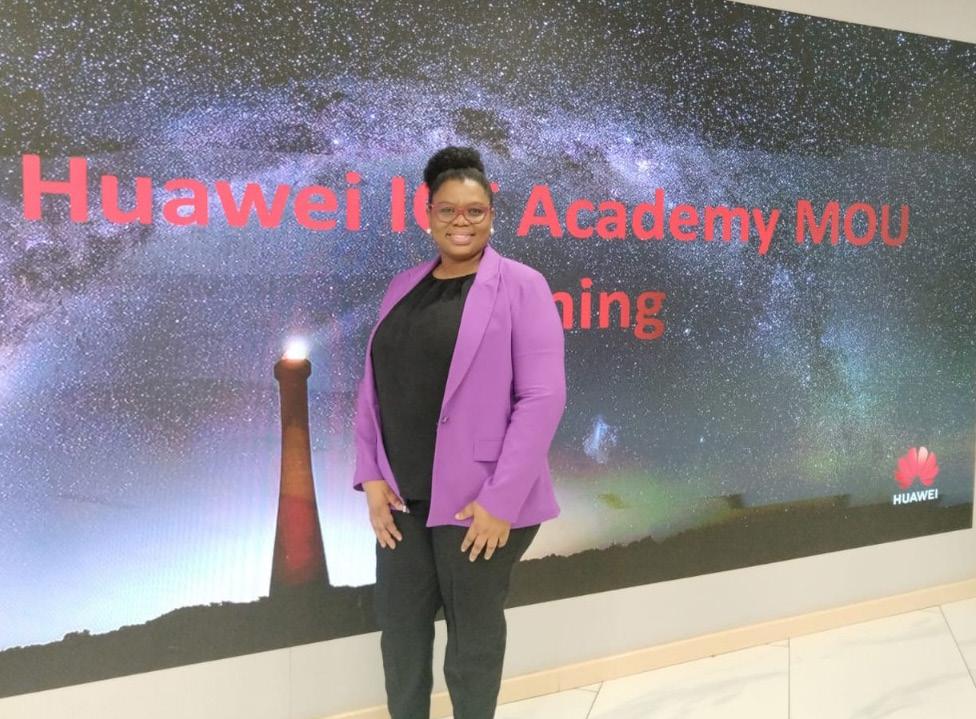
DIGITAL MILESTONE: Charles Cheng of Huawei South Africa, Professor Tembisa Ngqondi, and Dr Waldon Hendricks mark CPUT’s new status as an ICT Academy Support Centre at an MoU signing in Johannesburg. Picture: Supplied.
BUILDING CONNECTIONS: Dr Tabisa Ncubukezi, Head of the IT Department, attended the MOU signing between Huawei and the Faculty of Informatics and Design in Johannesburg. PICTURE: Supplied.

TWO DAYS INSIDE THE 2025 CISCO INSTRUCTOR & PARTNER CONFERENCE
By Jim Mohlala
I did not expect to walk into a digital revolution when I arrived at the Bellville Campus on the morning of 15 April. But that is exactly what the 2025 Cisco Networking Academy Instructor and Partner Conference delivered. The two-day event kicked off with Smangele Nkosi from Cisco South Africa, who spoke about taking digital learning beyond the classroom and into communities that are too often left behind.
Then Charmaine Houvet, Cisco’s Government Affairs Director, made a strong case for the value of certifications — not just degrees — when it comes to job readiness.
“Certifications are very important, regardless of whether someone comes in with a degree,” she said.
“We work closely with corporates, and most of them say that graduates expect to be trained, while those with certifications can hit the ground running.”
Gugu Sema, Senior Manager for 4IR at MICT SETA, echoed the urgency.
“The digital skills gap is real, and we don’t have time to waste. We have to build the future now,” said Sema.
For me, one of the most powerful moments came when Lee-Ann Major and Enoch Mankune from Go Fourth shared real stories of young people who took the training Cisco and its partners offered — and used it to change their lives. That landed hard. Later, Karim Ebeed, Cisco Networking Academy’s MEA Technical Manager, gave a live demo of new NetAcad features. Watching it unfold, I could not help thinking: this could change how education reaches people. Tools like that can bridge real gaps.
But the standout moment?
The panel led by Mariaan Christian on closing the gap between industry needs and IT skills. It was less of a discussion and more of a call to action. I couldn’t take notes fast enough. Walking out at the end of Day Two, I felt energised. This was not just another talk shop. It was a clear show of intent from people committed to building a more inclusive digital South Africa.

DIGITAL FUTURES:
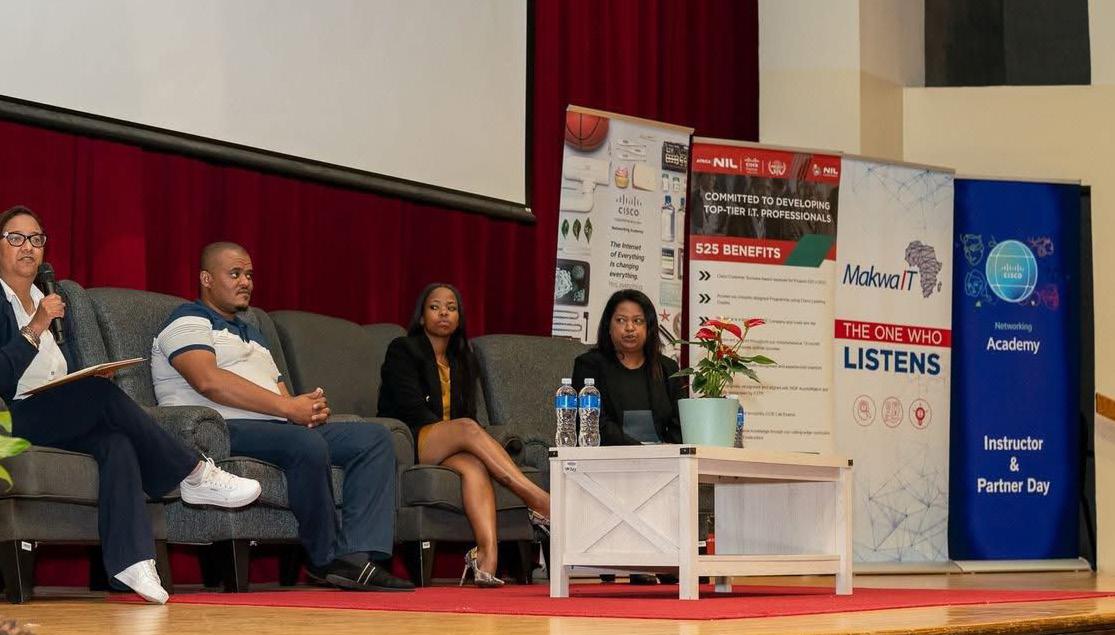
AFRICAN VOICES
FROM CONFLICT TO CUM LAUDE
By Philani Nombembe


Reem Ahmed’s path to graduating cum laude was anything but smooth. Born in Saudi Arabia to North Sudanese parents, she enjoyed a stable childhood — until she moved to Khartoum at 17 to study journalism. That decision changed everything.
“I wanted to reconnect with my heritage,” she said. “But it quickly turned into something traumatic.”
By 2019, political unrest in Sudan escalated into revolution and civil war. Ahmed, then studying for a mass communication degree at UMST, became a student activist. She was detained several times and feared for her life. In the end, she had to leave.
“I gathered what was left of my mental state, a broken dream and a suitcase, and flew to Cape Town.”
Her mother and siblings had already relocated to South Africa. But starting over was hard. She cried daily for weeks.
“It felt like I had no home, no past. I was nobody.”
Ahmed applied to South African universities but was rejected due to her International General Certificate of Secondary Education qualifications and incomplete degree. She enrolled in a project management certificate to bridge the gap, and by 2022, she reapplied — with Cape Peninsula University of Technology (CPUT) top of her list.
She was accepted on the journalism programme. In April, she graduated with a Diploma in Journalism after programme “Starting from scratch
was painful, but it made me fight harder,” she said.
Ahmed faced culture shock on arrival.
“As an African Arab, I found almost nothing familiar. The 11 official languages, especially isiXhosa with its click sounds, were unlike anything I’d known,” she said.
She immersed herself in South African life and learned about its politics, arts, and food. She was struck by the openness around gender roles and religious freedom.
“In Sudan, alcohol is banned, modest dress is expected, and women face strict limitations. Here, I saw women working freely, LGBTQ+ pride events, and casual public life.”
Food habits were different too.
“In Sudan, we eat with our hands. Here, people use utensils. But I’ve embraced it. And I love milk tart.”
While she hasn’t yet shared her culture widely, she said CPUT could do more to celebrate international students.
Adjusting was not easy. Language barriers and cultural differences made it hard to fit in at first.
But things shifted after she took part in a 2022 summer school with Germany’s Leibniz University. Group work helped her settle. She began tutoring Arabic-speaking students in English to support herself.
“Helping others is how I was raised,” she said. “It’s not about expecting anything in return.”
The 2025 Cisco Networking Academy Instructor and Partner Conference brought together educators and industry leaders at CPUT’s Bellville campus in April.
PICTURES: Jim Mohlala.
FROM TURMOIL TO TRIUMPH: Reem Ahmed, who left political unrest in Sudan, graduated cum laude with a National Diploma in Journalism.
PICTURE: Supplied.

COLLEAGUE REMEMBERED AT CAMPUS MEMORIAL IN MEMORY
By Philani Nombembe
Most of the stories I have written about Philippi over the past 20 years have been about crime. They take a toll. Whether it is speaking to a family that has just lost a breadwinner or a child — it stays with me. As a cub reporter, I used to cry in private after covering these stories, until I found ways to cope. But nothing prepared me for Wednesday, 11 June.
I had just arrived on the District Six campus when a colleague told me that one the cleaners had been shot and killed in her home in Siyahlala Informal Settlement, Philippi.
She described the incident plainly, in detail — the way sources often do. Then she showed me a photo. I winced. This one felt different. I had several interactions with the deceased. The first was when she walked into my first-year journalism class and asked me to keep a close eye on her sister’s daughter, who is in my class. She wanted to make sure that the student did not misbehave or skip classes.
We laughed — she reminded me of my grandmother, uMaRhoyi, who once told my tall, burly mathematics teacher to discipline me if I slacked off. Corporal punishment was still permitted in schools at that time, and I was trying to drop the subject.
I later learned that she was from Ngcisininde, in Ngqamakhwe — one of the areas I visited during my aimless youthful travels. We called each other mkhaya, and our conversations were about everyday matters: the weather, electricity prices, shared memories, and how her niece stopped answering her phone after receiving her NSFAS money.
However, I did not know her name until I attended her memorial service on Wednesday afternoon in the Commerce Building. Her name — Nolonwabo Tshumsila, aged 47 — and her photos were projected on a screen as her colleagues and family held back tears while speaker after speaker paid tribute. Her supervisor, Phoebe Thomson, was overcome with emotion.
“Today, we gather to honour the life, spirit, and legacy of Nolonwabo Tshumsila – a soul whose warmth, strength, and grace touched all who knew her,” read the programme.
“Though she may no longer walk among us, her light lives in the hearts of those she loved, the lives she impacted, and the memories we hold dear.”
In the midst of my own grief, I found myself comforting one of Tshumsila’s colleagues. The sobbing softened when mourners sang:
Ukuphumla bakuphiwe, bayahlala bonwabile; iinyembezi zisuliwe, zonk’ iintlungu ziphelile— from hymn 255, Hay’ inyhweba abanayo, of Methodist Church.
But the weight of the loss remained heavy when I spoke to her family and offered my condolences. They told me they had received a call around 8pm on Monday, 2 June, with news of the shooting. Details were unclear, and they are still waiting for the outcome of the police investigation.
Tshumsila is survived by her children, Siphosethu, 27, and Mandilakhe, 24.
“The family is devastated, but doing their best to stay strong,” said a relative who asked not to be named.
“We will remember her as someone who always had a smile. She did her best to make those around her feel joy. She truly lived up to her name — Nolonwabo.”
No arrests have been made. The police investigation is ongoing. She was buried in Ngqamakhwe on Saturday, 14 June. Lala ngoxolo MaKhumalo. Ugqatso ulufezile.
I quoted two verses from the book of Revelations when my cousin passed away in 2022. I found them relevant in this case.
Isityhilelo 21:4-5
Azisule uThixo zonke iinyembezi emehlweni abo. Kungabi sabakho kufa, kungabi sabakho nasijwili, nakukhala, nantlungu; ngoba izinto zokuqala zigqithile.
Waza lowo uhleli phezu kwetro- ne wathi, Ùyabona, izinto zonke ndizenza ntsha. Athi kum, Bhala; ngokuba lawo ngamazwi ayinyaniso, athembekileyo.

Colleague Nolonwabo Tshumsila, was

IN MEMORY:
shot and killed in Philippi. PICTURES: Supplied.
WHERE ARE THEY?
FORGING DREAMS IN METAL
By Philani Nombembe


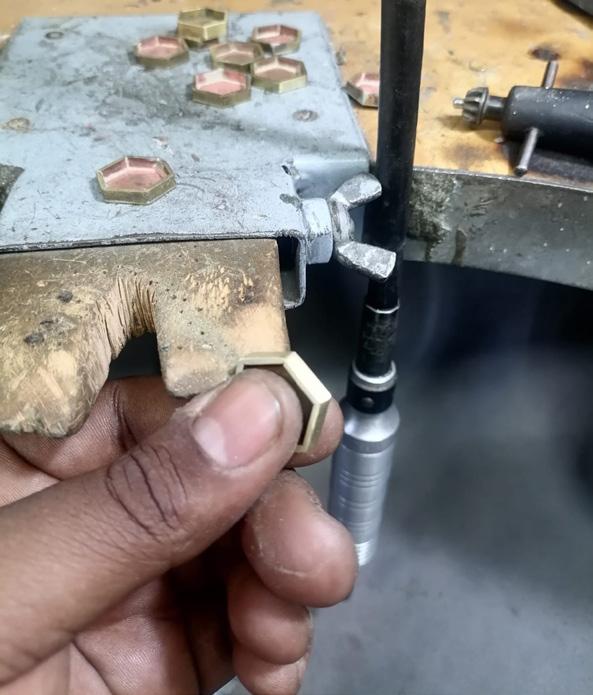

A visit to Cape Town’s Gold of Africa Museum sparked Prince Krewu’s interest in jewellery.
Krewu was struck by the design and craftsmanship of African jewellery. This led him to study jewellery design and manufacture at the Cape Peninsula University of Technology (CPUT), where he came fourth in the Anglo Platinum student competition.
Krewu, who graduated with a national diploma in 2014, now works as a senior lab technician at CPUT. He has collaborated on projects including pieces for Durban July and with other artists on custom work.
“I remember visiting the gold museum and being captivated by African jewellery and how futuristic it was back then, and fascinated by the craftsmanship,” he said.
“I decided right there that I wanted to make art out of gold, silver, copper and bronze. My time at CPUT was amazing, very educational, from the subjects that covered the understanding of jewellery to its science and to the competitions we were allowed to participate in.
“I came in fourth place in Anglo Platinum. CPUT shaped my vision on what’s still to come since it’s such an industry that one continues to learn daily.”
Krewu continues to share his experience with students.
“My responsibilities range from assisting learners with the usage of machinery and equipment to preparing instructional equipment and materials for practical classes, minor machinery repairs,” he said. “I have worked consistently since graduating, helping to secure this position, and my experience in the industry has helped me a lot.”
Krewu said jewellery has taught him patience.

“I’ve learned patience and communication, because knowing how to make jewellery is one thing, but if you cannot explain it, that means you don’t understand it. So knowing all steps correctly assures great results,” he said.
“One must be patient enough to see and analyse the matter before tackling it again.
“I’ve worked on a couple of memorable pieces, but one that stands out is a collaboration I did with a ceramic artist from KwaZulu-Natal and with a fashion designer named Ayi on some pieces for the Durban July races.”
Krewu said it was not hard to stay current with industry trends.
“It’s easy because they influence each other. It only changes when it starts getting more technology-based, since that’s where the future is heading,” he said.


“Keeping up with what’s current is easy if you remain grounded. I’m inspired by a lot of things — from nature to structures like buildings and even colour — so there’s a lot that inspires my work, but it’s all driven by passion.”
He advised students to act on their ideas.
“The advice I would give to a current student is to take in as much as you can and to use all the available resources. If they have an idea, they must start immediately, since the world is moving at a much faster pace than when I studied,” he said.
“With information at their fingertips, if they want to start something, the time is now. And to always remember why they are doing this, because a person can easily be demotivated due to failure, so consistency and dedication to the dream is what will remain.”
Krewu said he takes pride in making unique pieces.
“I don’t repeat designs, so no two are the same. One day, I hope my name will be known not just by experts, but by households across South Africa and beyond,” he said.

MICT SETA BURSARIES STRENGTHEN INDUSTRY-ACADEMIC LINKS
By Philani Nombembe
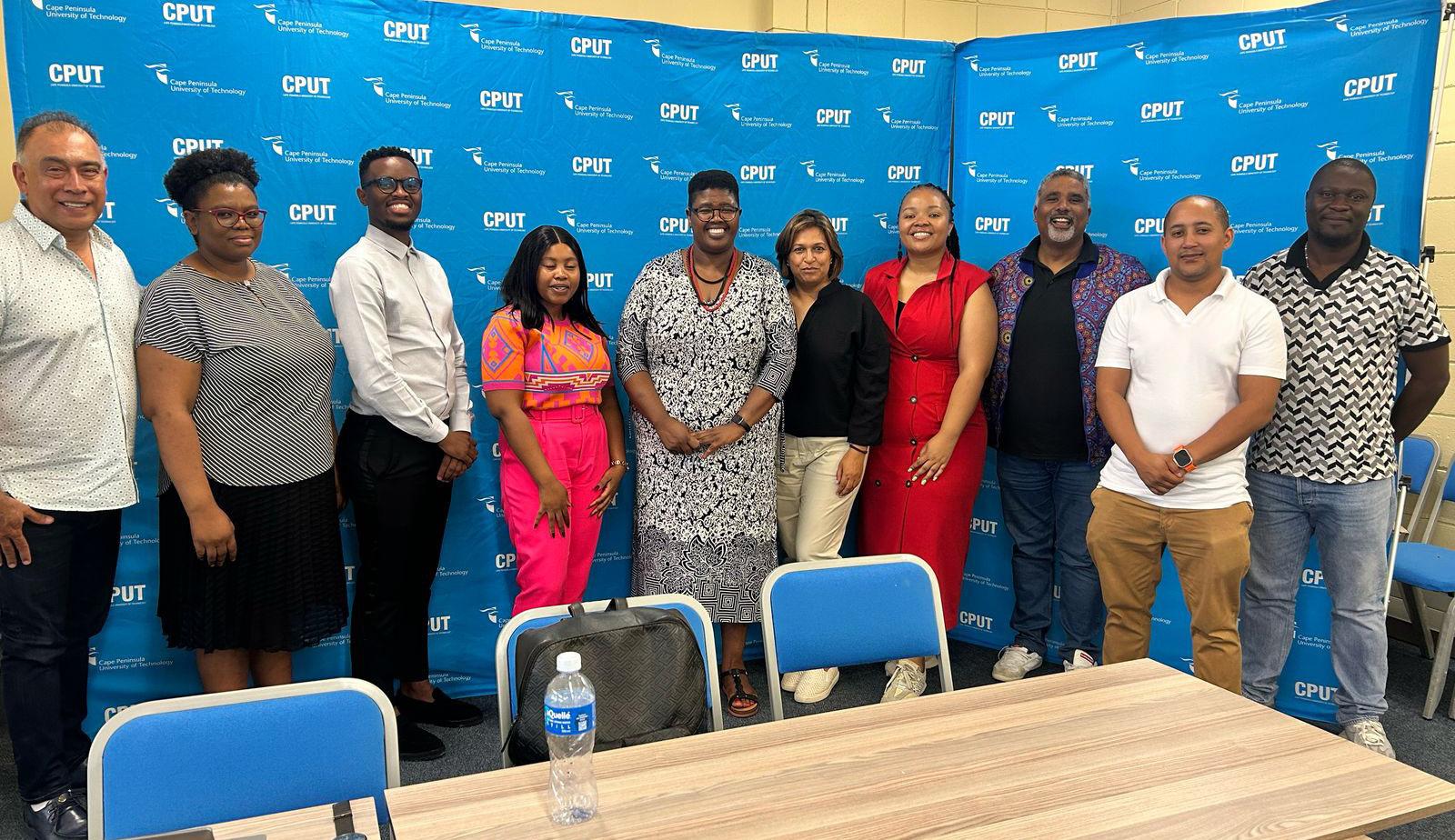
The partnership between the Faculty of Informatics and Design (FID) at the Cape Peninsula University of Technology (CPUT) and the Media, Information and Communication Technologies Sector Education and Training Authority (MICT SETA) is beginning to bear fruit.
The Information Technology Department has secured student bursaries funded by MICT SETA through its “research chairs” initiative. Senior IT lecturer Dr Errol Francke said the initiative, driven by FID Dean Professor Tembisa Ngqondi, aims to establish a cybersecurity simulation facility that will evolve into a centre of excellence.
“The research chair aligns with MICT SETA’s goal to promote innovation, improve system quality, and support cost-effective solutions,” said Francke.
CPUT is leading two interlinked projects in Cybersecurity and Enterprise Architecture. These will involve postgraduate students at master’s and doctoral levels, with postgraduate diploma students aligning their work to these research themes.
According to Francke, the funding will support bursaries, fieldwork, and the development of specialised infrastructure for cybersecurity research. “We will focus on smart building security using Internet of Things (IoT) technologies such as RFID, biometric sensors, facial recognition, and advanced networking systems,” he said.
“The Cybersecurity Simulation Facility will test smart access control and secure mobility solutions. It will feature testbeds for simulating cyber threats and assessing defensive mechanisms, helping to ensure robust, secure IoT applications.”
He said the initiative will extend beyond academic benefit.
“It will foster collaboration with industry, offering professionals practical exposure to cybersecurity challenges in IoT environments. The project will also develop skills in an area of growing demand.”
On 6 March, the department hosted a MICT SETA delegation to
BOOST FOR TECH TALENT: MICT SETA bursaries bolster CPUT’s IT Department, supporting postgraduate research and innovation.
PICTURE: Supplied.
discuss ongoing research and future collaboration. Francke said the visit focused on finalising funding for the 2025/26 financial year and reviewing project plans for the Cybersecurity Plan, Enterprise Architecture, and ICT Master Plan.
Delegates met students funded by MICT SETA and reviewed their research progress. Six students presented their projects during the visit.
“One key outcome was a proposal to officially launch the Research Chair in October 2025,” said Francke.
“We’re now planning operational requirements for the launch, which will further position CPUT as a leader in cybersecurity and enterprise architecture research.”
Dr Tabisa Ncubukezi, head of department, welcomed the news.
“The IT Department is pleased to have been awarded postgraduate bursaries from MICT SETA for three consecutive years,” she said.
“This reflects our ongoing commitment to academic excellence and to supporting future leaders in technology and innovation. We thank all who contributed and look forward to the impact this will have on our students and the wider research community.”

CULTURAL IDENTITIES OF AFRICA EXHIBITION SHOWCASES STUDENT CREATIVITY
By Philani Nombembe and Jim Mohlala
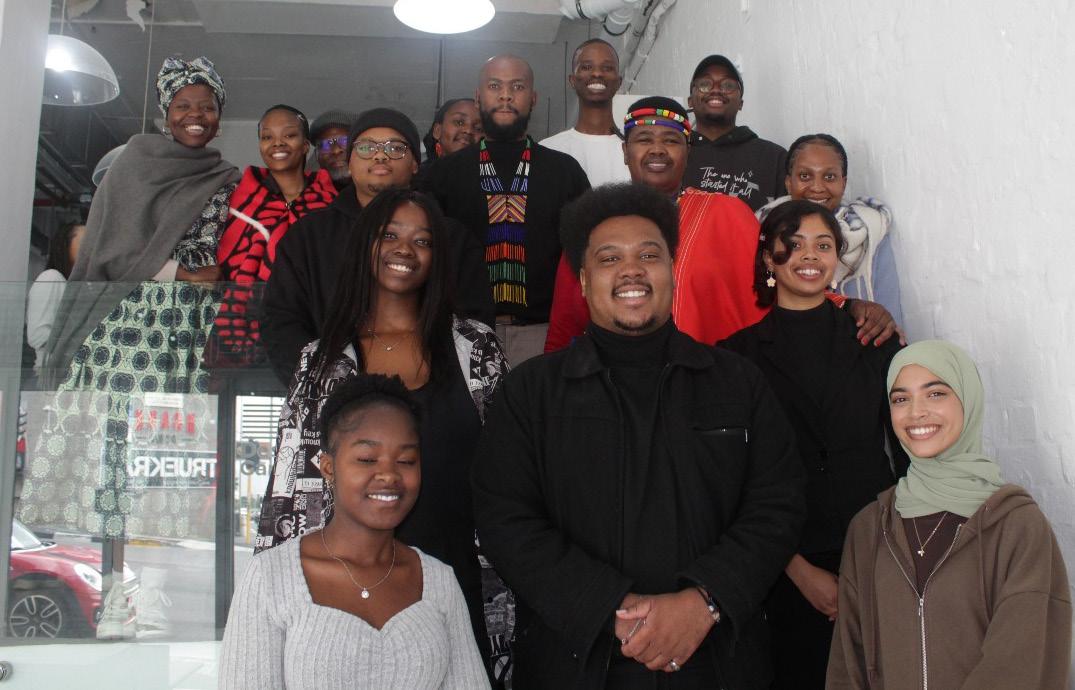

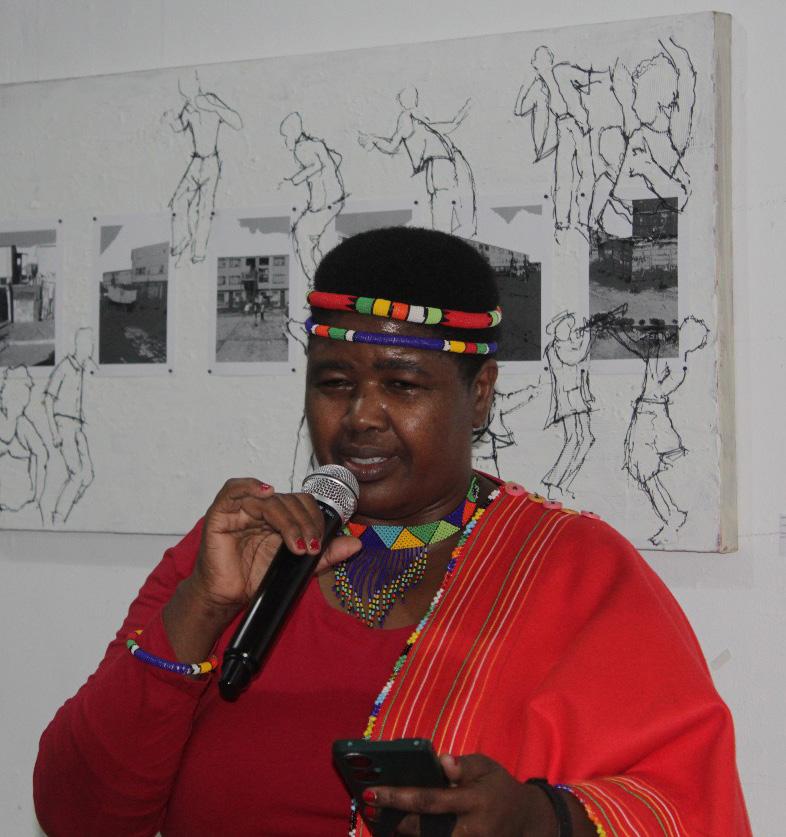

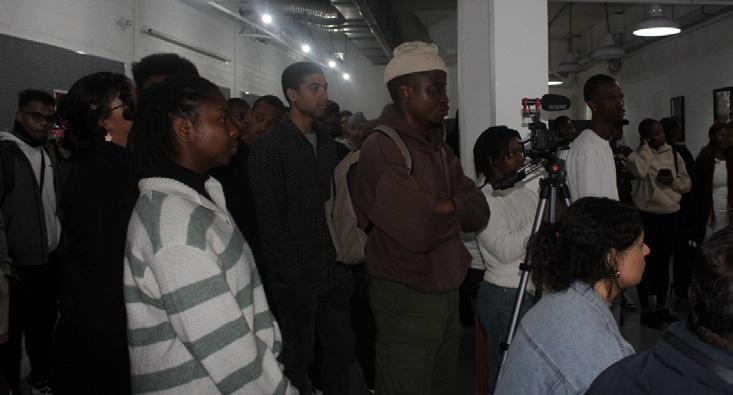
ON SHOW: Students present their work at the latest faculty exhibition, highlighting creativity, research and innovation across disciplines.
PICTURES: Philani Nombembe and Luke Swanepoel.



The Architectural Technology and Interior Design Department was abuzz with creative energy as it hosted the Faculty of Informatics and Design's (FID) captivating Cultural Identities of Africa event.
The walls were transformed into a kaleidoscopic gallery. An array of artwork in diverse mediums and formats adorned the walls. The event was held at the Roeland Street campus on May 26.
Rayner Moodley, head of department, described the exhibition as “a vibrant celebration of creativity, heritage and the diverse tapestry of our shared humanity”.
“Culture is a dynamic mosaic born from the threads of our history,” he said.
“The students’ work reflects South Africa’s multiple identities.”
FID Dean, Professor Tembisa Ngqondi, said the event marked a milestone for the faculty.
“It has been my wish to see the decolonisation of our curriculum realised in practice,” she said.
“We are also working to align our activities with the vision of the faculty and the university.”
Ngqondi said the exhibition was linked to wider transformation goals.
“Our vision centres on Ubuntu and unity. In African philosophy, we say 'umntu ngumntu ngabantu'. To address transformation, we needed a space to reflect the diversity of our institution and faculty.”
She said the faculty marks Africa Day annually to support the decolonisation and reimagining of education.
“We understand that our systems are informed by Eurocentric cultures and design principles,” she said.
“After reflecting on what we wanted to achieve, we agreed to present ourselves without compromising our identity. That led to the formation of the Cultivating Club. The idea is to be ourselves and to accept ourselves in the process. Today’s exhibition shows unity.”
Ngqondi emphasised that transformation was not about exclusion. “It is about rethinking what works and making it more inclusive,” she said. “We are not saying Eurocentric approaches must be removed from our teaching. We are saying our values must be included so that more cultures are visible.”
She said the exhibition demonstrated what students had learned and how they viewed themselves within both African and global contexts.
“What I like about the Cultivating Club is that it does not prescribe which cultures should be represented. It allows all cultures in the university space to be acknowledged. Learning is lifelong – and learning is an art.”
Sandile Busuku, creative director of the exhibition, shared his journey and the thinking behind the club.
“When I applied to CPUT for architectural technology, I was excited to be accepted,” he said.
“But I only realised at registration that I was placed in the extended programme. I was disappointed at first, thinking I would lose a year. But it turned out to be the best thing. I learned to draw and to collaborate with others.”
He said the Cultivating Club was formed to unite students in the design faculty and to encourage shared learning.
Busuku added, jokingly, that architecture students were not as good at football as fashion students.
“This is about cultivating unity and exploring other ways of learning. It also helps students gain confidence, build networks and even start generating income. I want everyone in the faculty to know this is open to all. Culture connects us. Even if it is not your own, you can still celebrate it. This is what the exhibition is about.”
He said another exhibition was planned later this year, titled Art of Collage.
“It will be open to all fields. For example, fashion students will create work based on fashion. We will send out the brief soon," he said.
CHASING PUNCHLINES
By Philani Nombembe

I did it again.
I ran the 10km Absa Run Your City race along Cape Town’s scenic route from Milnerton to the CBD on 11 May. The event began after Mayor Geordin Hill-Lewis delivered a brief, off-key rendition of a hype song, followed by a car raffle. The seeding process — though brief — felt like a lifetime, with most runners fidgeting in the mist. I met former colleague and mayoral spokesperson Lyndon Khan while the waves took off. After a few pleasantries, our conversation turned to work, perhaps as a distraction from the journey ahead.
After the national anthem and “Shosholoza” were played, a playlist blared from roadside speakers, and then we joined the crowd of runners heading into the city. It was all cheers and giggles until we reached the 1km mark near Lagoon Beach, where the gradient tested our stamina. Runners adjusted their pace accordingly.
My mind started to wander, but the incline brought me back to focus. I recalled a quote about the body achieving what the mind decides. After 50 paces, I reverted to my usual tactic: one step at a time. I pondered whether motivational speakers speak from experience or imagination, as reality often differs from their narratives.
Deciding to enjoy the journey, I observed my surroundings. A spectator held a sign reading, “Run as if you have stolen something,” which gave me a brief boost. Soon after, I passed a runner walking despite his “Faster forever” T-shirt.
Approaching the finish line, two metro police officers cheered us on with a choreographed rendition. Another sign read, “Run, your ex is coming,” prompting a final burst of speed. Before receiving my medal, I noticed tourists observing us and imagined them recounting the race back home, with me among the runners they saw. We passed several ATMs, including a brightly lit Absa machine, but no free notes were dispensed. The clean streets enhanced the experience.
I did not see the mayor or his spokesperson on the course; I hope I beat them.
In a statement, Hill-Lewis said the race has “had such a positive influence on our city — from showcasing Cape Town’s vibrant spirit and scenic beauty to uniting communities through the shared joy of running.”
“I’m incredibly excited to be on the start line this year, not necessarily out front with the elites, but right in the middle of the action with the thousands of everyday runners — because that’s where all the fun is,” said Hill-Lewis.
The race was founded in 2015.
“With its unique blend of fitness, fun, and community spirit, what bet ter way to celebrate a 10-year milestone than by running side by side through the vibrant streets of Cape Town?” Hill-Lewis said. Michael Meyer, the managing director of Stillwater Sports and found er of the Absa RUN YOUR CITY SERIES, said it was “truly amazing to welcome Cape Town Mayor Geordin Hill-Lewis to the start line of the Absa RUN YOUR CITY CAPE TOWN 10K in 2025”.
“Having the mayor take part in the event alongside thousands of run ners is incredibly meaningful to us, as it highlights the spirit of unity and celebration that defines this race,” said Meyer. “Over the past ten years, we’ve built a fantastic relationship with the City of Cape Town, and without their unwavering support, this event would not have grown into the iconic celebration of sport, culture, and community that it is today.”
The Absa Run Your City Series supports the Cancer Association of South Africa as the official charity of the entire series of events.


Applied Design
Fashion
Jewellery Design & Manufacture
Visual Communication Design
Product & Industrial Design
Design Post graduate studies
Design Foundations ECP
Head of Departments
Dr Monica Di Ruvo
diruvom@cput.ac.za
FID Assistant Dean & Acting Research Coordinator
Architectural Technology and Interior Design
Architectural Technology
Interior Design
Architectural Technology & Interior Design (ECP)
Prof Masilonyane Mokhele
Mr Rayner Moodley
Urban & Regional Planning
Information Technology & Multimedia
Urban & Regional Planning
Higher Certificate: Information & Communication Technology Service Management
Information & Communication Technology: Applications Development
Information & Communication Technology: Communication Networks
Information & Communication Technology: Multimedia Applications
BTech and Advanced Diploma in Information & Communication Technology
Post Graduate Studies
ICT Academy
Media and Communication
Film & Video Journalism
Photography Public Relations Management
Mr Brian Fisher-Holloway
(Acting HoD)
Dr Tabisa Ncubukezi
MokheleM@cput.ac.za
HOD-ATID@cput.ac.za
fisherhollowayb@cput.ac.za
NcubukeziT@cput.ac.za
Prof Nirvana Bechan
bechann@cput.ac.za
